formerly eScholarship Editions


|
|
|
|
Your request for similar items found 20 book(s). | Modify Search | Displaying 1 - 20 of 20 book(s) | |
| 1. | 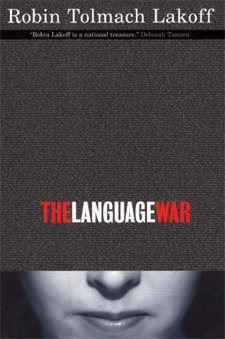 | Title: The language war Author: Lakoff, Robin Tolmach Published: University of California Press, 2000 Subjects: Language and Linguistics | Sociology | Literature | Media Studies Publisher's Description: Robin Lakoff gets to the heart of one of the most fascinating and pressing issues in American society today: who holds power and how they use it, keep it, or lose it. In a brilliant and vastly entertaining discussion of news events that have occupied an enormous amount of media space--political correctness, the Anita Hill/Clarence Thomas hearings, Hillary Rodham Clinton as First Lady, O. J. Simpson's murder trial, the Ebonics controversy, and the Clinton sex scandal--Lakoff shows that the struggle for power and status at the end of the century is being played out as a war over language. Controlling language is a basis for all power, she says, and therefore it is worth fighting for. As a result, newly emergent groups, especially blacks and women, are contending with middle- to upper-class white men for a share in "language rights." Lakoff's introduction to linguistic theories and the philosophy of language lays the groundwork for an exploration of news stories that meet what she calls the UAT (Undue Attention Test). As the stories became the subject of talk-show debates, late-night comedy routines, Web sites, and magazine articles, they were embroidered with additional meanings, depending on who was telling the story. Race, gender, or both are at the heart of these stories, and each one is about the right to construct meanings from languagein short, to possess power. Because language tells us how we are connected to one another, who has power and who does not, the stories reflect the language war. We use language to analyze what we call "reality," the author argues, but we mistrust how language is used today--witness the "politics of personal destruction" following the Clinton impeachment. Yet Lakoff sees in the struggle over language a positive goal: equality in the creation of our national discourse. Her writing is accessible and witty, and her excerpts from the media are used to great effect. [brief] Similar Items |
| 2. | 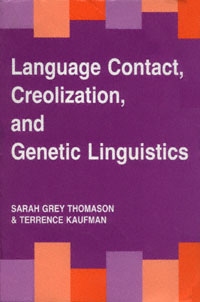 | Title: Language contact, creolization, and genetic linguistics Author: Thomason, Sarah Grey Published: University of California Press, 1992 Subjects: Language and Linguistics | Linguistic Theory | Cultural Anthropology Publisher's Description: Ten years of research back up the bold new theory advanced by authors Thomason and Kaufman, who rescue the study of contact-induced language change from the neglect it has suffered in recent decades. The authors establish an important new framework for the historical analysis of all degrees of conta . . . [more] Similar Items |
| 3. | 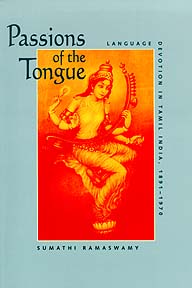 | Title: Passions of the tongue: language devotion in Tamil India, 1891-1970 Author: Ramaswamy, Sumathi Published: University of California Press, 1997 Subjects: Asian Studies | History | South Asia | Language and Linguistics | Asian History | Asian Literature Publisher's Description: Why would love for their language lead several men in southern India to burn themselves alive in its name? Passions of the Tongue analyzes the discourses of love, labor, and life that transformed Tamil into an object of such passionate attachment, producing in the process one of modern India's most intense movements for linguistic revival and separatism. Sumathi Ramaswamy suggests that these discourses cannot be contained within a singular metanarrative of linguistic nationalism and instead proposes a new analytic, "language devotion." She uses this concept to track the many ways in which Tamil was imagined by its speakers and connects these multiple imaginings to their experience of colonial and post-colonial modernity. Focusing in particular on the transformation of the language into a goddess, mother, and maiden, Ramaswamy explores the pious, filial, and erotic aspects of Tamil devotion. She considers why, as its speakers sought political and social empowerment, metaphors of motherhood eventually came to dominate representations of the language. [brief] Similar Items |
| 4. | 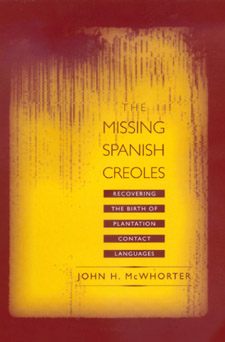 | Title: The missing Spanish creoles: recovering the birth of plantation contact languages Author: McWhorter, John H Published: University of California Press, 2000 Subjects: Language and Linguistics | Linguistic Theory | African Studies | American Studies Publisher's Description: John McWhorter challenges an enduring paradigm among linguists in this provocative exploration of the origins of plantation creoles. Using a wealth of data--linguistic, sociolinguistic, historical--he proposes that the "limited access model" of creole genesis is seriously flawed. That model maintains that plantation creole languages emerged because African slaves greatly outnumbered whites on colonial plantations. Having little access to the slaveholders' European languages, the slaves were forced to build a new language from what fragments they did acquire. Not so, says McWhorter, who posits that plantation creole originated in West African trade settlements, in interactions between white traders and slaves, some of whom were eventually transported overseas. The evidence that most New World creoles were imports traceable to West Africa strongly suggests that the well-established limited access model for plantation creole needs revision. In forcing a reexamination of this basic tenet, McWhorter's book will undoubtedly cause controversy. At the same time, it makes available a vast amount of data that will be a valuable resource for further explorations of genesis theory. [brief] Similar Items |
| 5. | 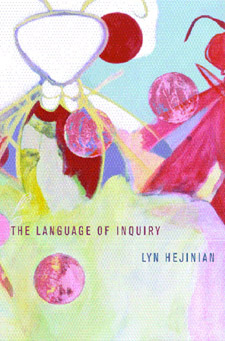 | Title: The language of inquiry Author: Hejinian, Lyn Published: University of California Press, 2000 Subjects: Literature | Poetry | Language and Linguistics Publisher's Description: Lyn Hejinian is among the most prominent of contemporary American poets. Her autobiographical poem My Life, a best-selling book of innovative American poetry, has garnered accolades and fans inside and outside academia. The Language of Inquiry is a comprehensive and wonderfully readable collection of her essays, and its publication promises to be an important event for American literary culture. Here, Hejinian brings together twenty essays written over a span of almost twenty-five years. Like many of the Language Poets with whom she has been associated since the mid-1970s, Hejinian turns to language as a social space, a site of both philosophical inquiry and political address. Central to these essays are the themes of time and knowledge, consciousness and perception. Hejinian's interests cover a range of texts and figures. Prominent among them are Sir Francis Bacon and Enlightenment-era explorers; Faust and Sheherazade; Viktor Shklovsky and Russian formalism; William James, Hannah Arendt, and Martin Heidegger. But perhaps the most important literary presence in the essays is Gertrude Stein; the volume includes Hejinian's influential "Two Stein Talks," as well as two more recent essays on Stein's writings. [brief] Similar Items |
| 6. | 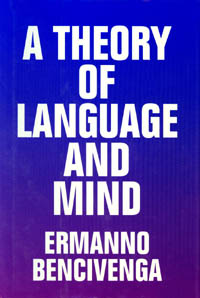 | Title: A theory of language and mind Author: Bencivenga, Ermanno 1950- Published: University of California Press, 1997 Subjects: Philosophy Publisher's Description: In his most recent book, Ermanno Bencivenga offers a stylistically and conceptually exciting investigation of the nature of language, mind, and personhood and the many ways the three connect. Bencivenga, one of the most iconoclastic voices to emerge in contemporary American philosophy, contests the basic assumptions of analytic (and also, to an extent, postmodern) approaches to these topics. His exploration leads through fascinating discussions of education, courage, pain, time and history, selfhood, subjectivity and objectivity, reality, facts, the empirical, power and transgression, silence, privacy and publicity, and play - all themes that are shown to be integral to our thinking about language. Relentessly bending the rules, Bencivenga frustrates our expectations of a "proper" theory of language. He invokes the transgressions of Nietzsche and Wittgenstein even as he appropriates the aphoristic style of Wittgenstein's Tractatus . Written in a philosophically playful and experimental mode, A Theory of Language and Mind draws the reader into a sense of continual surprise, therapeutic discomfort, and discovery. [brief] Similar Items |
| 7. | 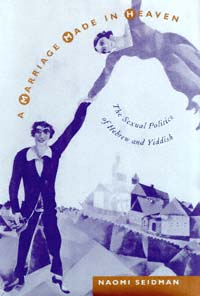 | Title: A marriage made in heaven: the sexual politics of Hebrew and Yiddish Author: Seidman, Naomi Published: University of California Press, 1997 Subjects: Jewish Studies | Gender Studies | Religion | Language and Linguistics Publisher's Description: With remarkably original formulations, Naomi Seidman examines the ways that Hebrew, the Holy Tongue, and Yiddish, the vernacular language of Ashkenazic Jews, came to represent the masculine and feminine faces, respectively, of Ashkenazic Jewish culture. Her sophisticated history is the first book-length exploration of the sexual politics underlying the "marriage" of Hebrew and Yiddish, and it has profound implications for understanding the centrality of language choices and ideologies in the construction of modern Jewish identity.Seidman particularly examines this sexual-linguistic system as it shaped the work of two bilingual authors, S.Y. Abramovitsh, the "grand-father" of modern Hebrew and Yiddish literature; and Dvora Baron, the first modern woman writer in Hebrew (and a writer in Yiddish as well). She also provides an analysis of the roles that Hebrew "masculinity" and Yiddish "femininity" played in the Hebrew-Yiddish language wars, the divorce that ultimately ended the marriage between the languages.Theorists have long debated the role of mother and father in the child's relationship to language. Seidman presents the Ashkenazic case as an illuminating example of a society in which "mother tongue" and "father tongue" are clearly differentiated. Her work speaks to important issues in contemporary scholarship, including the psychoanalysis of language acquisition, the feminist critique of Zionism, and the nexus of women's studies and Yiddish literary history. [brief] Similar Items |
| 8. | 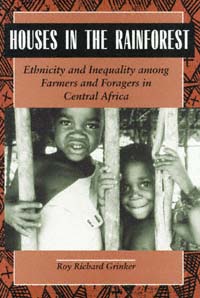 | Title: Houses in the rain forest: ethnicity and inequality among farmers and foragers in Central Africa Author: Grinker, Roy Richard 1961- Published: University of California Press, 1994 Subjects: Anthropology | African Studies | Cultural Anthropology Publisher's Description: This is the first ethnographic study of the farmers and foragers of northeastern Zaire since Colin Turnbull's classic works of the 1960s. Roy Richard Grinker lived for nearly two years among the Lese farmers and their long-term partners, the Efe (Pygmies), learned their languages, and gained unique insights into their complex social relations and ethnic identities. By showing how political organization is structured by ethnic and gender relations in the Lese house, Grinker challenges previous views of the Lese and Efe and other farmer-forager societies, as well as the conventional anthropological boundary between domestic and political contexts. [brief] Similar Items |
| 9. | 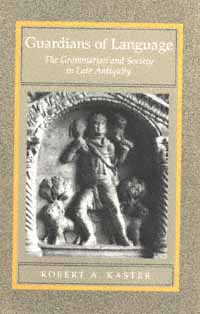 | Title: Guardians of language: the grammarian and society in late antiquity Author: Kaster, Robert A Published: University of California Press, 1997 Subjects: Classics | Classical Literature and Language | Language and Linguistics | Ancient History Publisher's Description: What did it mean to be a professional teacher in the prestigious "liberal schools" - the schools of grammar and rhetoric - in late antiquity? How can we account for the abiding prestige of these schools, which remained substantially unchanged in their methods and standing despite the political and religious changes that had taken place around them?The grammarian was a pivotal figure in the lives of the educated upper classes of late antiquity. Introducing his students to correct language and to the literature esteemed by long tradition, he began the education that confirmed his students' standing in a narrowly defined elite. His profession thus contributed to the social as well as cultural continuity of the Empire. The grammarian received honor - and criticism; the profession gave the grammarian a firm sense of cultural authority but also placed him in a position of genteel subordination within the elite.Robert A. Kaster provides the first thorough study of the place and function of these important but ambiguous figures. He also gives a detailed prosopography of the grammarians, and of the other "teachers of letters" below the level of rhetoric, from the middle of the third through the middle of the sixth century, which will provide a valuable research tool for other students of late-antique education. [brief] Similar Items |
| 10. | 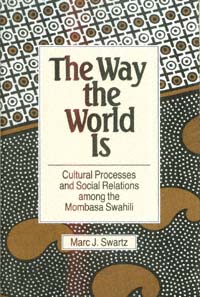 | Title: The way the world is: cultural processes and social relations among the Mombasa Swahili Author: Swartz, Marc J Published: University of California Press, 1991 Subjects: Anthropology | Cultural Anthropology | African Studies Publisher's Description: Marc Swartz takes us for the first time into the homes and neighborhoods of the Swahili in the East African port of Mombasa. At the same time he develops a new model for the operation and transmission of culture.In asking how cultural elements influence the social behavior of those who do not share them as well as of those who do, Swartz points to the mediation of status. The many types of status available to individuals provide guidelines that help explain, for example, why the broadly shared elements of Swahili culture (Islamic religion or the nuclear family) do not alone translate into behavior. The Way the World Is demonstrates in a highly original way how culture "works." [brief] Similar Items |
| 11. | 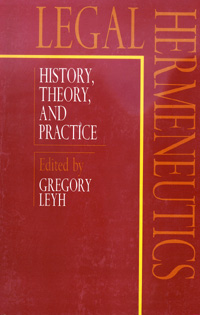 | Title: Legal hermeneutics: history, theory, and practice Author: Leyh, Gregory Published: University of California Press, 1992 Subjects: Politics | Political Theory | Postcolonial Studies | Law | Language and Linguistics Publisher's Description: Interpretation of the law is based on assumptions about the nature of texts, language, and the act of interpretation itself. These fourteen new essays trace the origin of these assumptions, examine their philosophical implications, and extend legal interpretation in new and constructive directions. Similar Items |
| 12. | 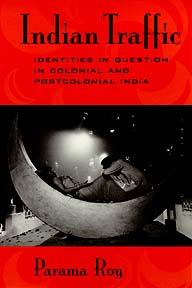 | Title: Indian traffic: identities in question in colonial and postcolonial India Author: Roy, Parama Published: University of California Press, 1998 Subjects: Postcolonial Studies | Literary Theory and Criticism | South Asia | Gender Studies Publisher's Description: The continual, unpredictable, and often violent "traffic" between identities in colonial and postcolonial India is the focus of Parama Roy's stimulating and original book. Mimicry has been commonly recognized as an important colonial model of bourgeois/elite subject formation, and Roy examines its place in the exchanges between South Asian and British, Hindu and Muslim, female and male, and subaltern and elite actors. Roy draws on a variety of sources - religious texts, novels, travelogues, colonial archival documents, and films - making her book genuinely interdisciplinary. She explores the ways in which questions of originality and impersonation function, not just for "western" or "westernized" subjects, but across a range of identities. For example, Roy considers the Englishman's fascination with "going native," an Irishwoman's assumption of Hindu feminine celibacy, Gandhi's impersonation of femininity, and a Muslim actress's emulation of a Hindu/Indian mother goddess. Familiar works by Richard Burton and Kipling are given fresh treatment, as are topics such as the "muscular Hinduism" of Swami Vivekananda. Indian Traffic demonstrates that questions of originality and impersonation are in the forefront of both the colonial and the nationalist discourses of South Asia and are central to the conceptual identity of South Asian postcolonial theory itself. [brief] Similar Items |
| 13. | 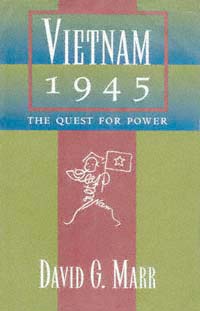 | Title: Vietnam 1945: the quest for power Author: Marr, David G Published: University of California Press, 1997 Subjects: History | Southeast Asia | Asian History | Politics Publisher's Description: 1945: the most significant year in the modern history of Vietnam. One thousand years of dynastic politics and monarchist ideology came to an end. Eight decades of French rule lay shattered. Five years of Japanese military occupation ceased. Allied leaders determined that Chinese troops in the north of Indochina and British troops in the South would receive the Japanese surrender. Ho Chi Minh proclaimed the Democratic Republic of Vietnam, with himself as president.Drawing on extensive archival research, interviews, and an examination of published memoirs and documents, David G. Marr has written a richly detailed and descriptive analysis of this crucial moment in Vietnamese history. He shows how Vietnam became a vortex of intense international and domestic competition for power, and how actions in Washington and Paris, as well as Saigon, Hanoi, and Ho Chi Minh's mountain headquarters, interacted and clashed, often with surprising results. Marr's book probes the ways in which war and revolution sustain each other, tracing a process that will interest political scientists and sociologists as well as historians and Southeast Asia specialists. [brief] Similar Items |
| 14. | 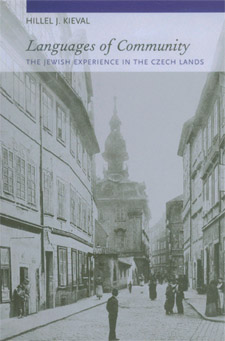 | Title: Languages of community: the Jewish experience in the Czech lands Author: Kieval, Hillel J Published: University of California Press, 2000 Subjects: Jewish Studies | European Studies | European History | Russian and Eastern European Studies | Judaism Publisher's Description: With a keen eye for revealing details, Hillel J. Kieval examines the contours and distinctive features of Jewish experience in the lands of Bohemia and Moravia (the present-day Czech Republic), from the late eighteenth to the late twentieth century. In the Czech lands, Kieval writes, Jews have felt the need constantly to define and articulate the nature of group identity, cultural loyalty, memory, and social cohesiveness, and the period of "modernizing" absolutism, which began in 1780, brought changes of enormous significance. From that time forward, new relationships with Gentile society and with the culture of the state blurred the traditional outlines of community and individual identity. Kieval navigates skillfully among histories and myths as well as demography, biography, culture, and politics, illuminating the maze of allegiances and alliances that have molded the Jewish experience during these 200 years. [brief] Similar Items |
| 15. | 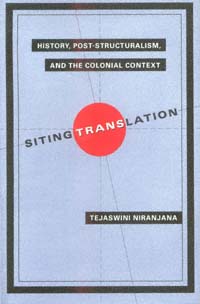 | Title: Siting translation: history, post-structuralism, and the colonial context Author: Niranjana, Tejaswini 1958- Published: University of California Press, 1992 Subjects: Postcolonial Studies | Literary Theory and Criticism | Southeast Asia | Cultural Anthropology Publisher's Description: The act of translation, Tejaswini Niranjana maintains, is a political action. Niranjana draws on Benjamin, Derrida, and de Man to show that translation has long been a site for perpetuating the unequal power relations among peoples, races, and languages. The traditional view of translation underwritten by Western philosophy helped colonialism to construct the exotic "other" as unchanging and outside history, and thus easier both to appropriate and control.Scholars, administrators, and missionaries in colonial India translated the colonized people's literature in order to extend the bounds of empire. Examining translations of Indian texts from the eighteenth century to the present, Niranjana urges post-colonial peoples to reconceive translation as a site for resistance and transformation. [brief] Similar Items |
| 16. | 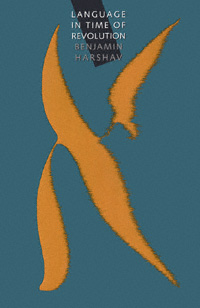 | Title: Language in time of revolution Author: Harshav, Benjamin 1928- Published: University of California Press, 1993 Subjects: Jewish Studies | History | Literature Similar Items |
| 17. | 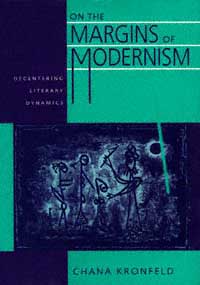 | Title: On the margins of modernism: decentering literary dynamics Author: Kronfeld, Chana Published: University of California Press, 1996 Subjects: Literature | Comparative Literature | Language and Linguistics | Literary Theory and Criticism | Jewish Studies Publisher's Description: Modernism valorizes the marginal, the exile, the "other" - yet we tend to use writing from the most commonly read European languages (English, French, German) as examples of this marginality. Chana Kronfeld counters these dominant models of marginality by looking instead at modernist poetry written in two decentered languages, Hebrew and Yiddish. What results is a bold new model of literary dynamics, one less tied to canonical norms, less limited geographically, and less in danger of universalizing the experience of minority writers.Kronfeld examines the interpenetrations of modernist groupings through examples of Hebrew and Yiddish poetry in Europe, the U.S., and Israel. Her discussions of Amichai, Fogel, Raab, Halpern, Markish, Hofshteyn, and Sutskever will be welcomed by students of modernism in general and Hebrew and Yiddish literatures in particular. [brief] Similar Items |
| 18. | 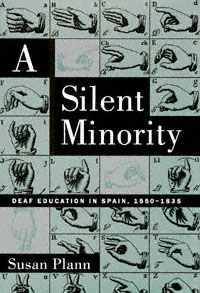 | Title: A silent minority: deaf education in Spain, 1550-1835 Author: Plann, Susan Published: University of California Press, 1997 Subjects: History | Language and Linguistics | Medieval History | European History | Education | European Studies | Medieval Studies | Cultural Anthropology | Cultural Anthropology Publisher's Description: This timely, important, and frequently dramatic story takes place in Spain, for the simple reason that Spain is where language was first systematically taught to the deaf. Instruction is thought to have begun in the mid-sixteenth century in Spanish monastic communities, where the monks under vows of silence employed a well-established system of signed communications. Early in the 1600s, deaf education entered the domain of private tutors, laymen with no use for manual signs who advocated oral instruction for their pupils. Deaf children were taught to speak and lip-read, and this form of deaf education, which has been the subject of controversy ever since, spread from Spain throughout the world.Plann shows how changing conceptions of deafness and language constantly influenced deaf instruction. Nineteenth-century advances brought new opportunities for deaf students, but at the end of what she calls the preprofessional era of deaf education, deaf people were disempowered because they were barred from the teaching profession. The Spanish deaf community to this day shows the effects of the exclusion of deaf teachers for the deaf.The questions raised by Plann's narrative extend well beyond the history of deaf education in Spain: they apply to other minority communities and deaf cultures around the world. At issue are the place of minority communities within the larger society and, ultimately, our tolerance for human diversity and cultural pluralism. [brief] Similar Items |
| 19. | 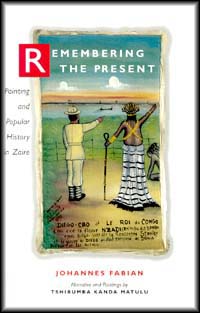 | Title: Remembering the present: painting and popular history in Zaire Author: Fabian, Johannes Published: University of California Press, 1996 Subjects: Anthropology | Cultural Anthropology | Art | African History | Politics | African Studies Publisher's Description: This book combines ethnography with the study of art to present a fascinating new vision of African history. It contains the paintings of a single artist depicting Zaire's history, along with a series of ethnographic essays discussing local history, its complex relationship to forms of self-expression and self-understanding, and the aesthetics of contemporary urban African and Third World societies. As a collaboration between ethnographer and painter, this innovative study challenges text-oriented approaches to understanding history and argues instead for an event- and experience-oriented model, ultimately adding a fresh perspective to the discourse on the relationship between modernity and tradition.During the 1970s, Johannes Fabian encouraged Tshibumba Kanda Matulu to paint the history of Zaire. The artist delivered the work in batches, together with an oral narrative. Fabian recorded these statements along with his own question-and-answer sessions with the painter. The first part of the book is the complete series of 100 paintings, with excerpts from the artist's narrative and the artist-anthropologist dialogues. Part Two consists of Fabian's essays about this and other popular painting in Zaire. The essays discuss such topics as performance, orality, history, colonization, and popular art. [brief] Similar Items |
| 20. | 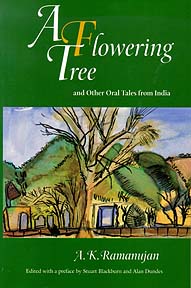 | Title: A flowering tree: and other oral tales from India A.K. Ramanujan ; edited with a preface by Stuart Blackburn and Alan Dundes Author: Ramanujan, A. K 1929- Published: University of California Press, 1997 Subjects: Literature | Fiction | Language and Linguistics | Asian Literature | Folklore and Mythology | South Asia Publisher's Description: This book of oral tales from the south Indian region of Kannada represents the culmination of a lifetime of research by A. K. Ramanujan, one of the most revered scholars and writers of his time. The result of over three decades' labor, this long-awaited collection makes available for the first time a wealth of folktales from a region that has not yet been adequately represented in world literature. Ramanujan's skill as a translator, his graceful writing style, and his profound love and understanding of the subject enrich the tales that he collected, translated, and interpreted.With a written literature recorded from about 800 A.D., Kannada is rich in mythology, devotional and secular poetry, and more recently novels and plays. Ramanujan, born in Mysore in 1929, had an intimate knowledge of the language. In the 1950s, when working as a college lecturer, he began collecting these tales from everyone he could - servants, aunts, schoolteachers, children, carpenters, tailors. In 1970 he began translating and interpreting the tales, a project that absorbed him for the next three decades. When Ramanujan died in 1993, the translations were complete and he had written notes for about half of the tales.With its unsentimental sympathies, its laughter, and its delightfully vivid sense of detail, the collection stands as a significant and moving monument to Ramanujan's memory as a scholar and writer. [brief] Similar Items |